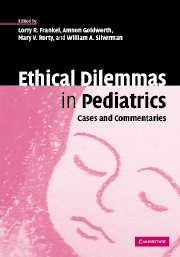Book contents
- Frontmatter
- Contents
- List of contributors
- Preface
- Introduction
- Part I Therapeutic misalliances
- Part II Medical futility
- Part III Life by any means
- 7.1 Where should a child die?
- 7.2 Where should a child (in the USA) die?
- 7.3 Topical discussion
- 8.1 Infant heart transplantation and hypoplastic left heart syndrome: what are the ethical issues?
- 8.2 Infant heart transplantation and hypoplastic left heart syndrome: a response
- 8.3 Topical discussion
- 9.1 Liver and intestinal transplantation
- 9.2 Transplantation and adolescents
- 9.3 Topical discussion
- Part IV Institutional impediments to ethical action
- References
- Index
7.2 - Where should a child (in the USA) die?
Published online by Cambridge University Press: 18 August 2009
- Frontmatter
- Contents
- List of contributors
- Preface
- Introduction
- Part I Therapeutic misalliances
- Part II Medical futility
- Part III Life by any means
- 7.1 Where should a child die?
- 7.2 Where should a child (in the USA) die?
- 7.3 Topical discussion
- 8.1 Infant heart transplantation and hypoplastic left heart syndrome: what are the ethical issues?
- 8.2 Infant heart transplantation and hypoplastic left heart syndrome: a response
- 8.3 Topical discussion
- 9.1 Liver and intestinal transplantation
- 9.2 Transplantation and adolescents
- 9.3 Topical discussion
- Part IV Institutional impediments to ethical action
- References
- Index
Summary
The most important feature of [western political] culture is a belief in individual human dignity; that people have the moral right – and the moral responsibility – to confront the most fundamental questions about the meaning and value of their own lives for themselves, answering to their own consciousness and convictions … Making a person die in a way that others approve, but that affronts his own dignity, is a serious, unjustified, unnecessary form of tyranny.
Ronald Dworkin (1993)American physicians and parents reading Roger Burne's moving account of the life and death of young William in Britain will be startled, I suspect, by the striking difference expected had a real-life drama of similar circumstances been enacted in the USA. When the parents and William said, in essence, “Enough!,” the unwritten moral code of professional behavior in Britain sanctioned their doctors' humane self-restraint, as well as the positive action taken by the doctors to make the necessary arrangements for the child to die at home. Moreover, the importance of family's private domain stands out prominently in the story from Burne's side of the Atlantic. The most crucial decisions taken by William's family took place on their own “turf.” Unlike too many situations in the USA, the family's deliberations in Britain did not take place in a court of law; and not in a hospital surrounded by well-meaning experts, who are, nonetheless, strangers.
- Type
- Chapter
- Information
- Ethical Dilemmas in PediatricsCases and Commentaries, pp. 162 - 165Publisher: Cambridge University PressPrint publication year: 2005



